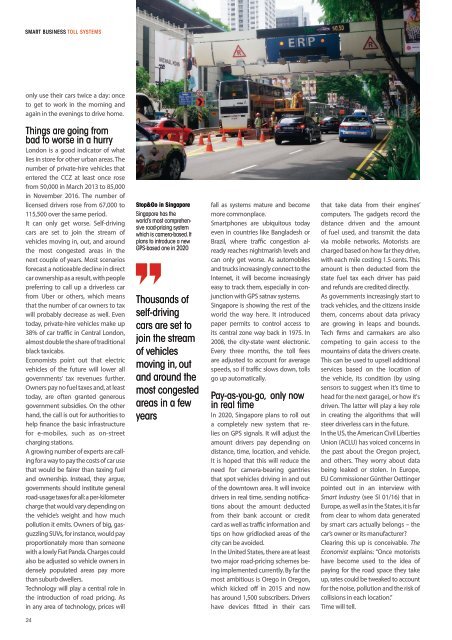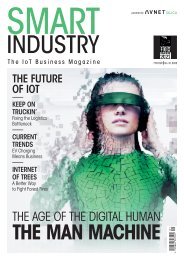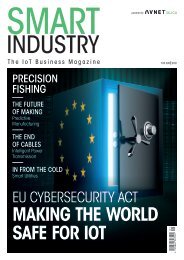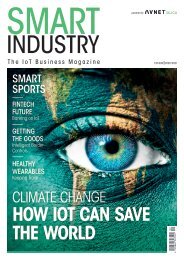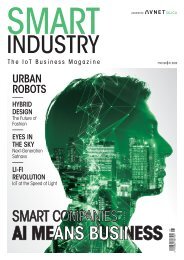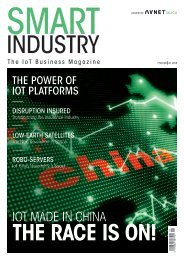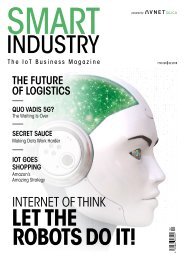Smart Industry 1/2018
Smart Industry 1/2018 - The IoT Business Magazine - powered by Avnet Silica
Smart Industry 1/2018 - The IoT Business Magazine - powered by Avnet Silica
You also want an ePaper? Increase the reach of your titles
YUMPU automatically turns print PDFs into web optimized ePapers that Google loves.
<strong>Smart</strong> Business Toll Systems<br />
only use their cars twice a day: once<br />
to get to work in the morning and<br />
again in the evenings to drive home.<br />
Things are going from<br />
bad to worse in a hurry<br />
London is a good indicator of what<br />
lies in store for other urban areas. The<br />
number of private-hire vehicles that<br />
entered the CCZ at least once rose<br />
from 50,000 in March 2013 to 85,000<br />
in November 2016. The number of<br />
licensed drivers rose from 67,000 to<br />
115,500 over the same period.<br />
It can only get worse. Self-driving<br />
cars are set to join the stream of<br />
vehicles moving in, out, and around<br />
the most congested areas in the<br />
next couple of years. Most scenarios<br />
forecast a noticeable decline in direct<br />
car ownership as a result, with people<br />
preferring to call up a driverless car<br />
from Uber or others, which means<br />
that the number of car owners to tax<br />
will probably decrease as well. Even<br />
today, private-hire vehicles make up<br />
38% of car traffic in Central London,<br />
almost double the share of traditional<br />
black taxicabs.<br />
Economists point out that electric<br />
vehicles of the future will lower all<br />
governments’ tax revenues further.<br />
Owners pay no fuel taxes and, at least<br />
today, are often granted generous<br />
government subsidies. On the other<br />
hand, the call is out for authorities to<br />
help finance the basic infrastructure<br />
for e-mobiles, such as on-street<br />
charging stations.<br />
A growing number of experts are calling<br />
for a way to pay the costs of car use<br />
that would be fairer than taxing fuel<br />
and ownership. Instead, they argue,<br />
governments should institute general<br />
road-usage taxes for all: a per-kilometer<br />
charge that would vary depending on<br />
the vehicle’s weight and how much<br />
pollution it emits. Owners of big, gasguzzling<br />
SUVs, for instance, would pay<br />
proportionately more than someone<br />
with a lowly Fiat Panda. Charges could<br />
also be adjusted so vehicle owners in<br />
densely populated areas pay more<br />
than suburb dwellers.<br />
Technology will play a central role in<br />
the introduction of road pricing. As<br />
in any area of technology, prices will<br />
Stop&Go in Singapore<br />
Singapore has the<br />
world’s most comprehensive<br />
road-pricing system<br />
which is camera-based. It<br />
plans to introduce a new<br />
GPS-based one in 2020<br />
Thousands of<br />
self-driving<br />
cars are set to<br />
join the stream<br />
of vehicles<br />
moving in, out<br />
and around the<br />
most congested<br />
areas in a few<br />
years<br />
fall as systems mature and become<br />
more commonplace.<br />
<strong>Smart</strong>phones are ubiquitous today<br />
even in countries like Bangladesh or<br />
Brazil, where traffic congestion already<br />
reaches nightmarish levels and<br />
can only get worse. As automobiles<br />
and trucks increasingly connect to the<br />
Internet, it will become increasingly<br />
easy to track them, especially in conjunction<br />
with GPS satnav systems.<br />
Singapore is showing the rest of the<br />
world the way here. It introduced<br />
paper permits to control access to<br />
its central zone way back in 1975. In<br />
2008, the city-state went electronic.<br />
Every three months, the toll fees<br />
are adjusted to account for average<br />
speeds, so if traffic slows down, tolls<br />
go up automatically.<br />
Pay-as-you-go, only now<br />
in real time<br />
In 2020, Singapore plans to roll out<br />
a completely new system that relies<br />
on GPS signals. It will adjust the<br />
amount drivers pay depending on<br />
distance, time, location, and vehicle.<br />
It is hoped that this will reduce the<br />
need for camera-bearing gantries<br />
that spot vehicles driving in and out<br />
of the downtown area. It will invoice<br />
drivers in real time, sending notifications<br />
about the amount deducted<br />
from their bank account or credit<br />
card as well as traffic information and<br />
tips on how gridlocked areas of the<br />
city can be avoided.<br />
In the United States, there are at least<br />
two major road-pricing schemes being<br />
implemented currently. By far the<br />
most ambitious is Orego in Oregon,<br />
which kicked off in 2015 and now<br />
has around 1,500 subscribers. Drivers<br />
have devices fitted in their cars<br />
that take data from their engines’<br />
computers. The gadgets record the<br />
distance driven and the amount<br />
of fuel used, and transmit the data<br />
via mobile networks. Motorists are<br />
charged based on how far they drive,<br />
with each mile costing 1.5 cents. This<br />
amount is then deducted from the<br />
state fuel tax each driver has paid<br />
and refunds are credited directly.<br />
As governments increasingly start to<br />
track vehicles, and the citizens inside<br />
them, concerns about data privacy<br />
are growing in leaps and bounds.<br />
Tech firms and carmakers are also<br />
competing to gain access to the<br />
mountains of data the drivers create.<br />
This can be used to upsell additional<br />
services based on the location of<br />
the vehicle, its condition (by using<br />
sensors to suggest when it’s time to<br />
head for the next garage), or how it's<br />
driven. The latter will play a key role<br />
in creating the algorithms that will<br />
steer driverless cars in the future.<br />
In the US, the American Civil Liberties<br />
Union (ACLU) has voiced concerns in<br />
the past about the Oregon project,<br />
and others. They worry about data<br />
being leaked or stolen. In Europe,<br />
EU Commissioner Günther Oettinger<br />
pointed out in an interview with<br />
<strong>Smart</strong> <strong>Industry</strong> (see SI 01/16) that in<br />
Europe, as well as in the States, it is far<br />
from clear to whom data generated<br />
by smart cars actually belongs – the<br />
car’s owner or its manufacturer?<br />
Clearing this up is conceivable. The<br />
Economist explains: “Once motorists<br />
have become used to the idea of<br />
paying for the road space they take<br />
up, rates could be tweaked to account<br />
for the noise, pollution and the risk of<br />
collisions in each location.”<br />
Time will tell.<br />
24


